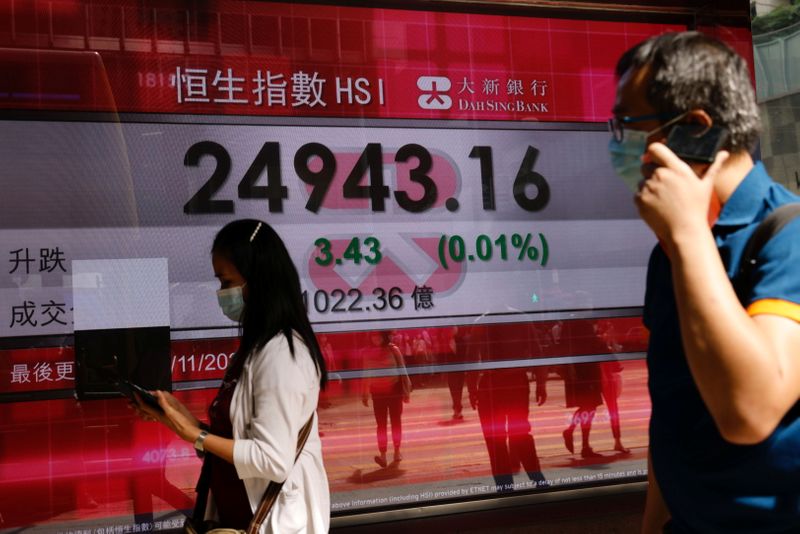SHANGHAI/HONG KONG (Reuters) - China's new energy shares and Apple (NASDAQ:AAPL) suppliers led the gains in the A-share market on Thursday, while defence companies lost ground, as early returns from the U.S. election pointed to a win for Democratic challenger Joe Biden.
While analysts expect little change in U.S. policy toward China whatever the outcome, a Biden administration is expected to bring a more nuanced, multilateral approach to trade and a less hawkish foreign policy toward developments in the Taiwan Strait.
Democrat Joe Biden on Wednesday predicted a U.S. election win over President Donald Trump after pivotal victories in Michigan and Wisconsin, while the Republican incumbent sought to offset a narrowing path to re-election with lawsuits and demands for a recount.
APPLE SUPPLIERS
China's Apple suppliers have been sensitive to the ups and downs in the Sino-U.S. trade war, reflecting concerns of possible Chinese restrictions on U.S. tech firms including the Cupertino, California-based giant.
Shares of those suppliers gained on Thursday, with acoustic component maker AAC Technologies (OTC:AACAY), BYD Electronic International and Sunny Optical Technology rising between 3.3% and 6%.
On the mainland, Shenzhen Desay Battery Technology, Shennan Circuits Co Ltd, Goertek Inc and Foxconn Industrial Internet firmed between 2.7% and 8.9%.
NEW ENERGY
China's new energy firms are expected to benefit from a Biden presidency, given his pledge to invest more in renewable energy.
Sales of electric, plug-in hybrid and hydrogen-powered vehicles in China, the world's biggest auto market, are forecast to rise to 20% of overall new car sales by 2025 from just 5% now, according to State Council.
The CSI300 new energy index climbed as much as 4.4% on Thursday, having gained nearly 70% this year.
Battery giant Contemporary Amperex Technology (CATL) surged about 150% this year, while solar panel components maker LONGi Green nearly tripled in value.
DEFENCE
Simmering geopolitical tensions around the Sino-Indian border, the Taiwan Strait and the South China Sea have boosted defence companies as Beijing intensifies its military build-up, including preparations to challenge American power further afield.
A second Trump administration is likely to exacerbate those tensions, a potential boon for defence contractors.
A Biden White House is widely expected to take a less confrontational approach in its trans-Pacific diplomacy, though the previous Democratic administration of Barack Obama, in which Joe Biden served as vice president, also clashed with China over its claims to the South China Sea.
The CSI defense index shed as much as 1.6% on Thursday, bucking a broad rally in the market. The index has gained over 50% so far this year.
TECH
U.S. restrictions on exports to China's tech and semiconductor industries have marked the sector as a key battleground in the Sino-U.S. trade war as China drives for self-sufficiency.
It is not immediately clear whether Biden would ease restrictions on China's tech industry if elected.
China has been pushing forward with reforms in its capital markets, including a registration-based IPO system for the tech-focused STAR Market and Shenzhen's start-up board, to help better finance its tech industry and foster new growth drivers.
The tech-heavy start-up board ChiNext added 1.3% on Thursday, while the STAR50 index was up 1.1%. Both indexes gained 55% and 47%, respectively, this year.
China's top chipmaker Semiconductor Manufacturing International Corp rose as much as 7.6%, having rallied nearly 100% this year.

For Reuters live coverage of the U.S. election, please visit https://www.reuters.com/live-events/election-2020-15-id2942501